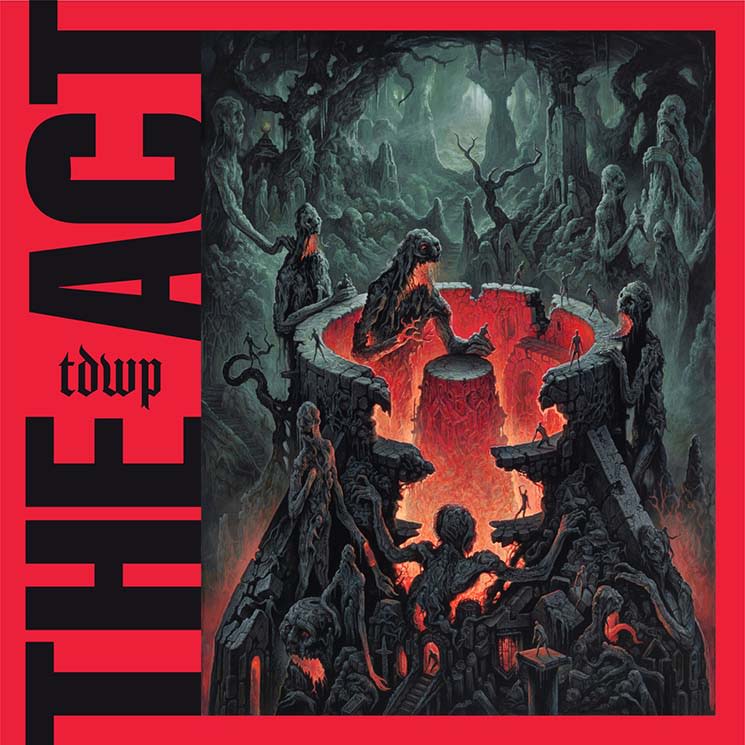The Devil Wears Prada are one of few metalcore acts that have managed to remain at the top throughout the genre's evolution. For almost 15 years, TDWP have adapted to metalcore's ever-changing landscape without sacrificing their sense of authenticity. As many of metalcore's biggest acts have begun to take the genre in a new direction, TDWP are at a creative crossroad once again: stick with what works or adapt?
On the heels of such genre-defying releases as Northlane's Alien, Bring Me the Horizon's amo, and Underoath's Erase Me, The Act is TDWP's attempt at following suit. Like those, The Act favours a bare-bones style of metalcore that focuses more so on production and arrangement than technical prowess and face-melting riffs. Unfortunately, unlike the aforementioned albums, there doesn't seem to be a cohesive sound that TDWP can call their own on The Act.
"If you throw enough shit against the wall, some of it is bound to stick," seems to be the band's motto, as they never fully commit to a single sound, delivering a mixed bag of some old and some new. Songs like "Chemical," "Numb," "Isn't It Strange?" and "Please Say No" sound like covers of moody pop songs, while "Switchblade," "The Thread" and "Spiderhead" sound like they could have landed on any one of TDWP's last three albums. Instead of blending their trademark sound with elements of pop, The Act offers one or the other.
Mature and intimate lyricism is a high point on The Act, but many of the album's most poignant moments are ruined by frontman Mike Hranica's newfound penchant for spoken word. Mike's deeply exaggerated attempted sounds like someone rehearsing poetry on the toilet after having eaten nothing but steak and potatoes. It sounds silly and it distracts from the album's contemplations and self-reflections.
The production, by session keyboardist Jon Gering, is probably the best part of The Act; it's apparent he's a formidable producer and songwriter. The mix is blended perfectly, allowing breathing room for each part, and the synths are expertly written and never superfluous.
The issue isn't that TDWP attempted to employ elements of pop into their music; the issue is the lack of conviction. The album's best tracks are the ones that stick with the old proven method. Everything else lacks the sort of innovation we would come to expect from such seasoned vets.
(Solid State)On the heels of such genre-defying releases as Northlane's Alien, Bring Me the Horizon's amo, and Underoath's Erase Me, The Act is TDWP's attempt at following suit. Like those, The Act favours a bare-bones style of metalcore that focuses more so on production and arrangement than technical prowess and face-melting riffs. Unfortunately, unlike the aforementioned albums, there doesn't seem to be a cohesive sound that TDWP can call their own on The Act.
"If you throw enough shit against the wall, some of it is bound to stick," seems to be the band's motto, as they never fully commit to a single sound, delivering a mixed bag of some old and some new. Songs like "Chemical," "Numb," "Isn't It Strange?" and "Please Say No" sound like covers of moody pop songs, while "Switchblade," "The Thread" and "Spiderhead" sound like they could have landed on any one of TDWP's last three albums. Instead of blending their trademark sound with elements of pop, The Act offers one or the other.
Mature and intimate lyricism is a high point on The Act, but many of the album's most poignant moments are ruined by frontman Mike Hranica's newfound penchant for spoken word. Mike's deeply exaggerated attempted sounds like someone rehearsing poetry on the toilet after having eaten nothing but steak and potatoes. It sounds silly and it distracts from the album's contemplations and self-reflections.
The production, by session keyboardist Jon Gering, is probably the best part of The Act; it's apparent he's a formidable producer and songwriter. The mix is blended perfectly, allowing breathing room for each part, and the synths are expertly written and never superfluous.
The issue isn't that TDWP attempted to employ elements of pop into their music; the issue is the lack of conviction. The album's best tracks are the ones that stick with the old proven method. Everything else lacks the sort of innovation we would come to expect from such seasoned vets.




